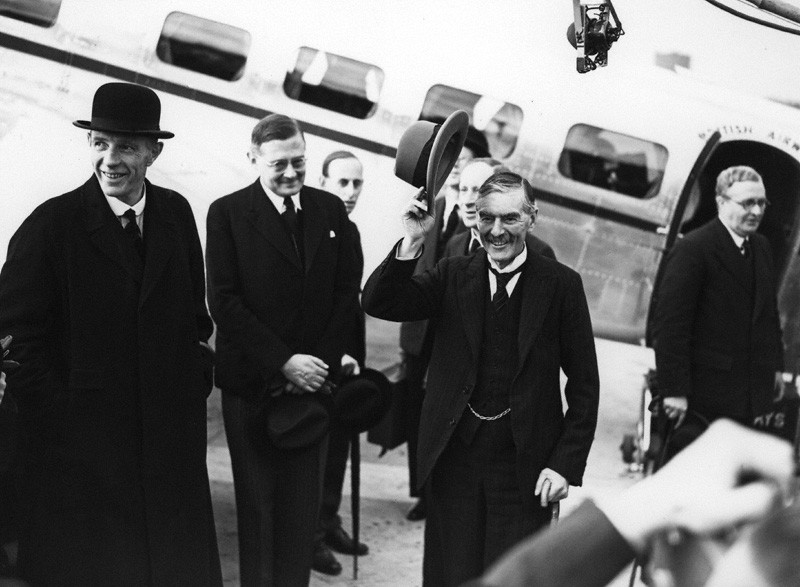For He’s a Jolly Good Fellow and WW2 December 18, 2014
Author: Beach Combing | in : Contemporary , trackbackA painful moment from 1939, at least for any Britons reading this post. Neville Chamberlain and his capable foreign minister, Lord Halifax, have travelled, 11 January, to Rome for a meeting of minds with Mussolini. In fact, Britain is just nine months away from a World War and a year and a half away from war with Italy. The talks between Chamberlain and Halifax, on the one hand, and Mussolini and Ciano, on the other, proved predictably stilted and Mussolini particularly was unimpressed by Chamberlain, the man with the umbrella, as a representative of British manhood. The decisive image from the trip came at the end of the visit on the platform at Rome station. There the British colony in the city showed up to salute their Prime Minister and these men and women, who saw Chamberlain, no doubt, as the ensurer of future good relations between Britain and Italy, broke spontaneously into song. And what did they sing? God Save the Queen, Jerusalem or the thunderous verses of Land of Hope and Glory? Not a bit of it… They sang For He’s a Jolly Good Fellow, that limp-wristed little tune that could turn the stomach of a habitual Mills and Boons reader: any who do not know it might want to follow this youtube link for the full horror, it is a kind of Happy Birthday for pretend grown ups. To make matters worse tears filled Chamberlain’s eyes as he listened! This would have been all good and proper in a railway station in New York with members of the Senate looking on, or just conceivably in Paris, the French had long since learnt to expect the weird from the Brits. But in manly, macho Rome?! Mussolini turned incredulous to ask ‘what is this little song?’
Ciano, Mussolini’s foreign secretary, would later write up the Duce’s words about the trip. ‘These men [i.e. Chamberlain and Halifax] are not made of the same stuff as Francis Drake and the other magnificent adventurers who created the Empire. They are after all the tired sons of a long line of rich men.’ (In a sense this was true though Chamberlain and Halifax had lived hard knocks in their youth: they were not anywhere near as effete and decadent as the totalitarian Europeans reckoned them.) Ciano himself added in his diary: ‘The British do not want to fight. They try to draw back as slowly as possible, but they do not want to fight…’ Chamberlain, meanwhile, returned home painfully oblivious. It had been a ‘truly wonderful visit’ which had strengthened the chances of peace: in fact, it had done just the opposite… There was a lot to be said for keeping Britain out of the Second World War, there was a lot to be said for plunging in. But Chamberlain’s middle road policy led to nothing but disaster, bringing Britain to a gun fight with a sabre. The Italians caught a glimpse of that sword on the station at Rome. The consequences would be unfortunate. Other scenes from Britain’s failed appeasement: drbeachcombing At yahoo DOT com



